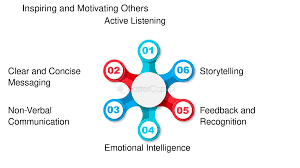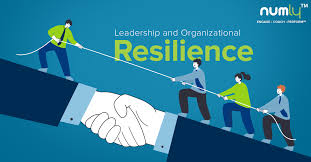In the face of adversity, resilient leaders play a crucial role in guiding their teams through challenging situations. They not only manage crises but also inspire their teams to remain focused, adapt, and excel despite the difficulties. Resilience in leadership is not just about bouncing back from setbacks; it’s about maintaining a positive outlook, fostering strength, and instilling confidence in others. This article explores how leaders can lead with resilience, inspire their teams to persist through tough times, and ultimately drive success even in the most challenging of circumstances.

Introduction: The Importance of Resilience in Leadership
Key Concepts: Resilience, leadership, crisis management, team motivation
Leadership during difficult times requires more than just tactical decisions—it demands emotional strength, clarity, and the ability to inspire hope. Resilient leaders help their teams navigate uncertainty by fostering a sense of purpose, maintaining a positive outlook, and leading by example. In a volatile business environment, resilience becomes a defining trait that can differentiate effective leaders from those who struggle. By cultivating resilience, leaders can ensure that their teams persist, adapt, and emerge stronger from challenges.
1. Defining Resilience in Leadership
Key Concepts: Resilience, emotional intelligence, adaptability, persistence
Resilience in leadership is the ability to cope with setbacks, stay focused on long-term goals, and adapt to changing circumstances. It involves maintaining a calm demeanor during crises, demonstrating problem-solving skills, and encouraging others to keep moving forward despite obstacles. Resilient leaders are emotionally intelligent, self-aware, and skilled at managing stress—qualities that help them maintain control during tough times and lead their teams through uncertainty.
Actionable Steps for Leaders:
- Cultivate emotional intelligence by practicing self-awareness and empathy.
- Develop strategies to cope with stress and maintain mental clarity during difficult situations.
- Stay focused on long-term goals and communicate the path forward, even when immediate outcomes are uncertain.
2. Leading by Example: Demonstrating Resilience in Action
Key Concepts: Role model, leadership example, confidence, trust
Leaders set the tone for their teams. In challenging situations, how a leader responds will influence how their team reacts. By demonstrating resilience in their actions, leaders show their teams that it is possible to remain focused and optimistic even during setbacks. Whether it's maintaining confidence, managing emotions, or making difficult decisions, leading by example helps to instill trust and motivate the team to persist.
Actionable Steps for Leaders:
- Show transparency and vulnerability by openly acknowledging challenges while maintaining optimism.
- Model calm decision-making under pressure to demonstrate how to handle adversity.
- Encourage open communication, allowing team members to express concerns and collaborate on solutions.
3. Building a Resilient Team Culture
Key Concepts: Team culture, collaboration, trust, shared vision
A resilient team culture starts with the leadership, but it is strengthened by collaboration, trust, and a shared vision. Resilient teams support one another during tough times and stay focused on collective goals. Leaders must foster a culture where team members feel empowered to step up, share ideas, and support one another. A strong team culture helps individuals persevere because they know they are part of something bigger than themselves.
Actionable Steps for Leaders:
- Encourage teamwork and create opportunities for employees to collaborate on problem-solving.
- Foster a sense of community within the team, where everyone feels supported and valued.
- Reinforce the team’s shared goals and vision to keep everyone aligned during challenges.
4. Fostering a Growth Mindset During Adversity
Key Concepts: Growth mindset, learning, adaptability, perseverance
A growth mindset—the belief that abilities and intelligence can be developed—is crucial for resilience. Leaders who encourage a growth mindset in their teams help individuals view challenges as opportunities for growth, rather than as insurmountable obstacles. When teams understand that setbacks are part of the learning process, they are more likely to persist, adapt, and innovate to overcome adversity.
Actionable Steps for Leaders:
- Promote a culture of learning by encouraging employees to view challenges as opportunities to develop new skills.
- Support continuous improvement by providing training and resources for employees to grow and adapt.
- Celebrate learning experiences from failures, and encourage teams to reflect on what went wrong and how to improve.

5. Maintaining Focus and Clarity in the Midst of Crisis
Key Concepts: Focus, clarity, strategic planning, prioritization
During tough times, it is easy for teams to become overwhelmed by distractions, fear, or confusion. Resilient leaders help their teams stay focused on the key objectives and provide clarity on the organization’s direction. By simplifying complex situations, setting clear priorities, and maintaining focus on the most important goals, leaders ensure that their teams don’t lose sight of their purpose.
Actionable Steps for Leaders:
- Communicate a clear, consistent vision and strategy for navigating the crisis.
- Break down long-term goals into smaller, manageable tasks to keep teams focused.
- Regularly check in with the team to assess progress and adjust plans if necessary, while maintaining focus on the bigger picture.
6. Encouraging Adaptability and Flexibility
Key Concepts: Adaptability, flexibility, problem-solving, change management
In times of crisis, rigid plans may no longer be effective. Resilient leaders encourage their teams to be flexible and adaptable. They understand that change is inevitable, and they promote a mindset that embraces new solutions and alternative approaches. By fostering adaptability, leaders ensure that their teams can pivot quickly and stay productive, even when the circumstances change dramatically.
Actionable Steps for Leaders:
- Encourage creative problem-solving and alternative approaches to challenges.
- Promote agility in decision-making and operational processes, allowing the team to pivot when necessary.
- Support innovation by allowing space for experimentation and calculated risk-taking.
7. Providing Emotional Support and Encouragement
Key Concepts: Emotional support, empathy, team morale, well-being
Leaders must also address the emotional needs of their teams during tough times. Acknowledging the emotional toll of crises and providing support is essential to maintaining morale and engagement. By offering empathy, understanding, and encouragement, leaders help individuals feel supported and valued, reducing stress and fostering resilience.
Actionable Steps for Leaders:
- Regularly check in with employees to understand their emotional well-being.
- Provide resources, such as counseling or stress-relief programs, to help employees cope with pressure.
- Offer words of encouragement and reinforce the team’s ability to overcome challenges.
8. Celebrating Resilience and Successes, Big and Small
Key Concepts: Recognition, success, resilience, team motivation
Celebrating milestones, even small ones, can have a profound impact on team morale. Resilient leaders take the time to recognize and celebrate efforts and achievements, helping to reinforce the message that perseverance and hard work lead to success. These celebrations not only boost morale but also remind teams that their efforts are making a difference.
Actionable Steps for Leaders:
- Acknowledge and celebrate both individual and team accomplishments during tough times.
- Share stories of resilience and success to inspire others within the organization.
- Reinforce the team’s sense of purpose by connecting their achievements to the organization’s overall vision.

9. Learning from Adversity and Strengthening the Organization
Key Concepts: Resilience building, reflection, continuous improvement, organizational growth
Resilience isn’t just about managing adversity—it’s about learning from it and emerging stronger. After a crisis, resilient leaders reflect on what worked, what didn’t, and how the organization can be better prepared for future challenges. This reflection process leads to continuous improvement and growth, ensuring that both individuals and the organization as a whole become more resilient over time.
Actionable Steps for Leaders:
- Conduct post-crisis reviews to assess what lessons can be learned and applied moving forward.
- Use adversity as an opportunity to refine processes and strengthen organizational resilience.
- Share insights from the crisis with the broader team to collectively grow from the experience.
Conclusion: Leading with Resilience for Lasting Impact
Key Concepts: Resilience, leadership, team success, transformation
Leaders who embody resilience not only help their teams survive challenging times—they help them thrive. By setting a strong example, fostering a growth mindset, maintaining focus, and providing emotional support, resilient leaders inspire their teams to persist and excel in the face of adversity. Through resilience, leaders create organizations that are better equipped to handle challenges, innovate in tough times, and emerge stronger and more united.
Actionable Steps for Leaders:
- Lead by example, demonstrating calm, clarity, and resilience in the face of adversity.
- Foster a growth mindset, adaptability, and emotional support to keep teams motivated and engaged.
- Celebrate successes, learn from challenges, and continuously strengthen resilience within the organization.


You must be logged in to post a comment.